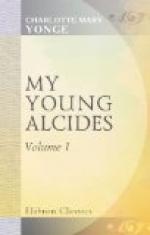I was very glad to linger on, for I clung to the home, and looked at every bush and flower, blossoming for the last time, almost as if I were dying, and leaving them to a sort of fiend. My mother’s old friends, Lady Diana Tracy and Lord Erymanth, her brother, used to bemoan with me the coming of this lad, born of a plebeian mother, bred up in a penal colony, and, no doubt, uneducated except in its coarsest vices. Lord Erymanth told at endless length all the advice he had given my father in vain, and bewailed the sense of justice that had bequeathed the property to such a male heir as could not fail to be a scourge to the country. Everyone had some story to tell of Ambrose’s fiery speeches and insubordinate actions, viewing Eustace as not so bad because his mere satellite—and what must not their sons be?
The only person who had any feeling of pity or affection for them was old Miss Woolmer. She was the daughter of a former clergyman of Mycening, the little town which is almost at our park-gates. She was always confined to the house by rheumatic-gout. She had grown up with my brothers. I sometimes wondered if she had not had a little tenderness for one of them, but I believe it was almost elder-sisterly. She told me much in their excuse. My father had never been the fond, indulgent father to them that I remembered him, but a strict, stern authority when he was at home, and when he was absent leaving them far too much to their own devices; while Prometesky was a very attractive person, brilliant, accomplished, full of fire and of faith in his theories of universal benevolence and emancipation.
She thought, if the times had not been such as to bring them into action, Ambrose would have outgrown and modified all that was dangerous in his theories, and that they would have remained mere talk, the ebullition of his form of knight-errantry; for it was generous indignation and ardour that chiefly led him astray, and Eustace was always his double: but there were some incidents at the time which roused him to fury. Lewthwayte was a Cumberland man, who had inherited the stock and the last years of a lease of a farm on Lord Erymanth’s property; he had done a good deal for it, and expended money on the understanding that he should have the lease renewed, but he was a man of bold, independent northern tongue, and gave great offence to his lordship, who was used to be listened to with a sort of feudal deference. He was of the fierce old Norse blood, and his daughters were tall, fair, magnificent young women, not at all uneducated nor vulgar, and it was the finding that my brothers were becoming intimate at his farm that made Lord Erymanth refuse to renew the lease and turn the family out so harshly, and with as little notice as possible.




